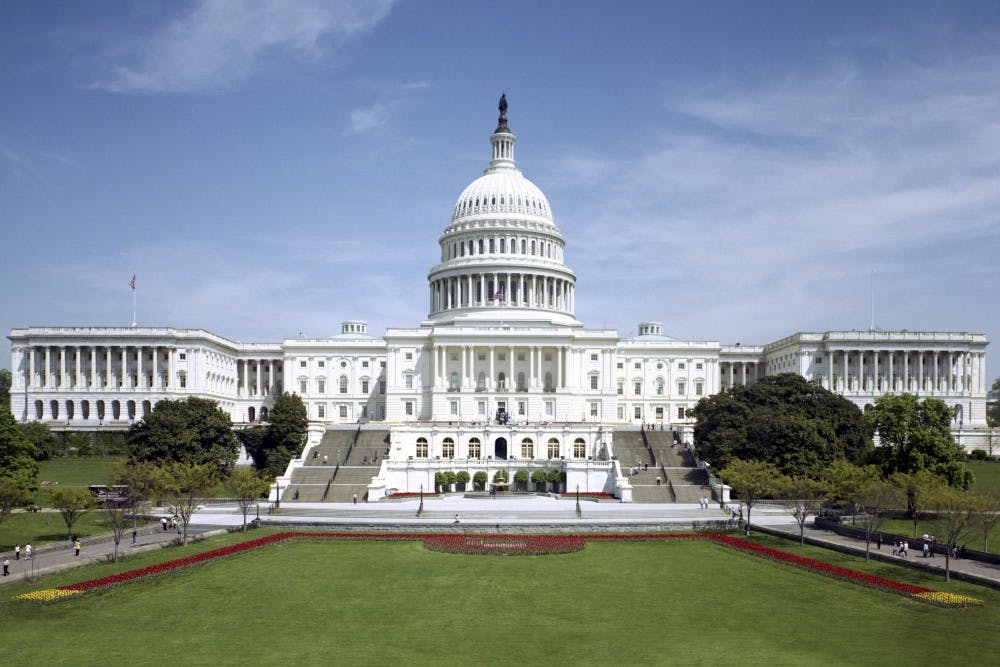
The Penn Political Union held a parliamentary-style debate on Thursday on the utility of personal contribution limits to curb campaign spending | Courtesy of the Architect of the Capitol
84 percent of Americans believe money has too much influence in campaigns, according to a 2015 CBS poll. This sentiment has resonated on both ends of the political spectrum — both Sen. Bernie Sanders and presidential candidate and 1968 Wharton graduate Donald Trump tout their independence from Political Action Committees — colloquially known as Super PACs.
Penn Political Union held a parliamentary-style debate on Thursday on the utility of personal contribution limits to curb campaign spending. Students split into groups opposing or affirming the resolution: “This House would remove personal contribution limits to political parties.”
Throughout the event, both sides condemned the amount of money, especially “dark” money, involved in campaigning. They criticized the power of super PACs and of the Koch brothers.
Debaters disagreed about whether getting rid of the personal contribution limit to political parties would fix or worsen these problems.
Students debating in favor of the resolution said political parties must represent the interests of as much of population as possible in order to win, and therefore are democratic. They argued that parties support moderates with records of coalition-building and compromise.
Large individual donors tend to donate to more extreme candidates on both ends of the political spectrum, they said. One student mentioned Ted Cruz as an example of an obstructionist who is supported by large donors instead of by his party.
Opposition members argued that large donors would still donate to PACs if personal contribution limits to political parties were removed. They said removing these personal contribution limits would only promote the interests of the wealthy over those of working-class Americans. PACs do not have to disclose their donors, whereas political parties must publish the identities of large donors, so donors who wish to remain anonymous would donate to PACs.
One student argued that the government ought to be an open market of free discourse but is currently an oligopoly, a market dominated by only a few firms. He said the proposal would just add two more firms — the Democratic and Republican parties — to an already small pool of large donors.
At the end of the debate, students voted on the proposition — 23 were in support of maintaining personal contribution limits, while 14 voted to abolish them and 13 abstained from voting.
While many PPU members thoroughly prepare for their debates, some come to hear the ideas of others.
“A lot of people come to just watch and enjoy the debate,” College junior and Government and Politics Association President Sarah Simon said.
Debaters cracked jokes with their opponents throughout the event. Several students referenced a recent incident in British Parliament, when MP Dennis Skinner was ejected from the House of Commons for repeatedly referring to Prime Minister David Cameron as “Dodgy Dave.” PPU members had shared the viral video in Facebook groups before the event.
“Objection! Madame Speaker, I ask that you ask Mr. Overfield to withdraw that adjective,” shouted College junior Samuel Byers over raucous laughter. He had been referred to as “the gentleman known as shady Sam.”
Simon also joined in the joke, calling her opponent “Corrupt Korey.”
“Half of the fun of this is the theatrics,” Byers said after the event. “It’s fun for everyone, and people get into that kind of back-and-forth.”
The Daily Pennsylvanian is an independent, student-run newspaper. Please consider making a donation to support the coverage that shapes the University. Your generosity ensures a future of strong journalism at Penn.
DonatePlease note All comments are eligible for publication in The Daily Pennsylvanian.





